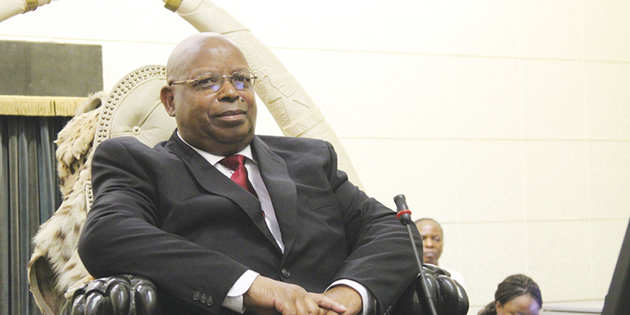Speaker raps academics

Zvamaida Murwira Senior Reporter
The Speaker of the National Assembly Advocate Jacob Mudenda, yesterday rapped academics for failing to make constructive criticism of Government’s economic blueprint Zim-Asset so as to advise Parliament on its impact on the economy, particularly on domestic resource mobilisation.Adv Mudenda was addressing Members of Parliament during a pre-budget briefing in Harare.
“I have wondered and I have addressed myself to various universities where they have departments of economics. There has not been a single critique of Zim-Asset from any of our universities, where you get these doctorates in economics, but they have not criticised this document constructively. And worse still, you cannot have an economic blueprint that is not subjected to an annual review, to say how far have we gone in implementing this economic blueprint! What is it that we achieved in 2014, 2015, now we are in 2016; what have we achieved in 2016 and identify the stumbling blocks,” said Adv Mudenda.
He said academics at universities should be coming to Parliament to assist on how Zim-Asset had fared and how it could be improved on.
“We cannot have Zim-Asset as a decorative document like a mirror all the time. At least, the mirror shows how you look like, but this Zim-Asset, if it is not cleaned up so that it shows us how we look like, how good is it if we are not pursuing its implementation? So, these scholars at our universities have let us down.
“They should be the ones coming to Parliament and asking ‘do we see what we see, this is our analysis?’ And all are benefiting from state coffers. We do not want research that is done for people out there, we want research that is done for people here in Zimbabwe then our universities will be relevant,” said Adv Mudenda.
Southern African Parliamentary Trust executive director, Mr John Makamure, said legislators should use the Public Finance Management Act to hold the Executive accountable.
He said they should strengthen the portfolio and thematic committee system to speak with one voice so as to deal with challenges of whipping.Speaking at the same occasion, Reserve Bank of Zimbabwe Deputy Director for Economic Research, Mr Samuel Tarinda, said the country required Foreign Direct Investment if an economic turnaround was to be achieved.
He said the advantage of FDIs was that they were not debts, but investors would recoup their investment from the profit that would accrue.
Mr Tarinda said low confidence remained a major obstacle to investment.On fiscal space, Mr Tarinda said revenues have consistently been below target, but what was more worrying with Zimbabwe’s scenario was that actual revenue collection was dwindling.
“That means the economy is shrinking, which is quite worrying. We believe there is a lot of money that is circulating outside the banking system because there is a cruel animal called confidence. Government at the moment is relying on Treasury Bills as a tool for financing, but TBs are by themselves a debt instrument. We are not solving a problem but merely postponing it,” said Mr Tarinda.
He said Government was relying more on domestic resources, which hampered the role of the private sector.
“Government has relied more on domestic resources. When Government claims large chunks of resources, it means for the private sector, there is a corresponding decline of credit that is supposed to support growth initiatives, this is what we call crowding out effect. It means Government is crowding out the private sector, yet the private sector is supposed to be the engine of transformative growth. There is also an element of destabilising the financial sector, which is supposed to mobilise the resources that we require, so the exposure of the financial sector to Government is also an ingredient, which might cause medium-to-long term instability,” said Mr Tarinda.








Comments